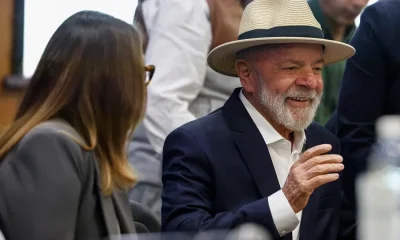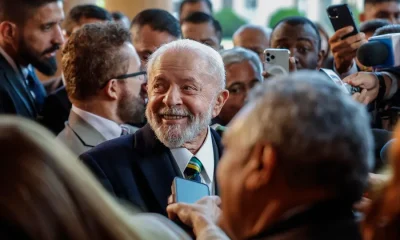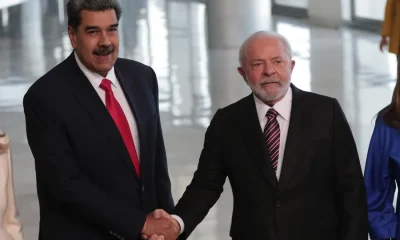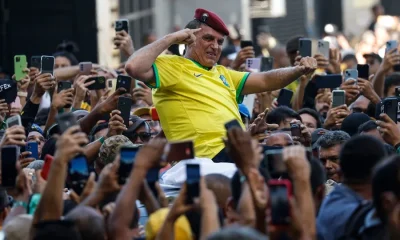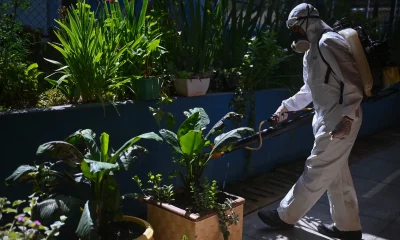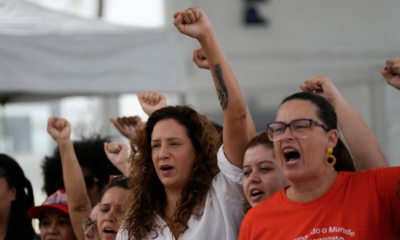International
‘Brazil is back,’ Lula hails at Latin America leaders summit
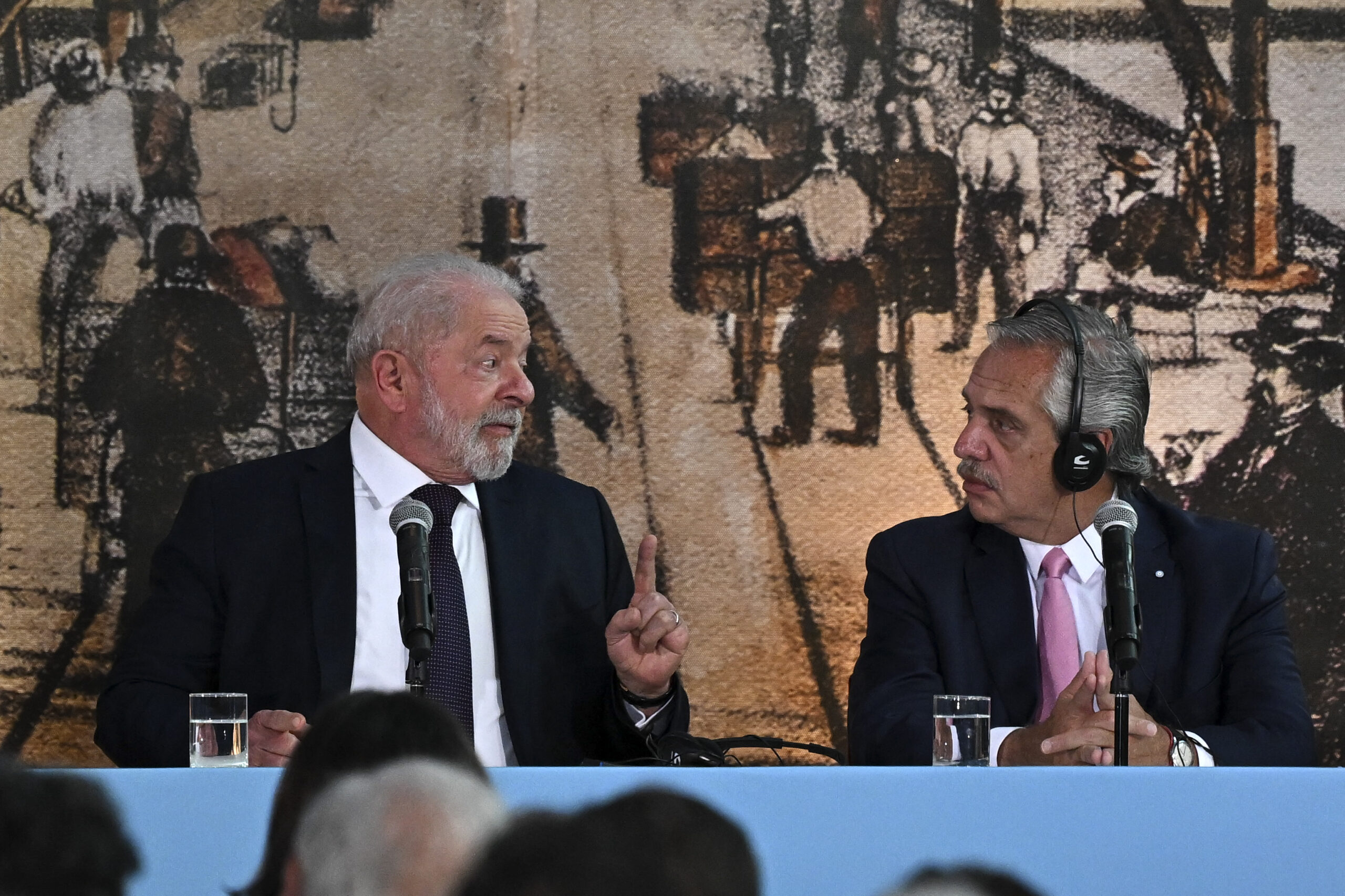
January 25 | By AFP | Philippe Bernes-Lasserre / Mauricio Rabuffetti |
Brazilian President Luiz Inacio Lula da Silva declared Tuesday that his country is “back in the region” after joining more than a dozen other Latin American leaders at a summit in Buenos Aires.
Less than a month after his inauguration, Lula arrived in the Argentine capital looking to rebuild bridges after his far-right predecessor Jair Bolsonaro had pulled out of the grouping.
“Brazil is back in the region and ready to work side-by-side with you with a very strong feeling of solidarity and closeness,” said the 77-year-old leader during the seventh Community of Latin American and Caribbean States (CELAC) summit, which brings together 33 nations.
Lula, who previously served as Brazil’s president from 2003-10, was one of the founders of CELAC during the first “pink wave” of leftward political shifts on the continent over a decade ago.
But Bolsonaro pulled Brazil out of the group over what he perceived as its support for undemocratic governments in Nicaragua, Venezuela and Cuba.
Lula spoke Tuesday about the “multiple crises” affecting the world — from the pandemic to climate change, geopolitical tensions, food insecurities and threats to democracy.
“All this happens in the midst of an unacceptable rise in inequality, poverty and hunger,” said Lula, the only leader to publicize his speech at the summit.
Democracy and its threats — especially from the far right — were a central theme of the summit.
“We cannot allow the recalcitrant and fascist far right to put our institutions and our people in peril,” said the host of the forum, Argentina’s center-left President Alberto Fernandez, in opening remarks.
He pointed to the riots by Bolsonaro supporters at the seats of power in Brasilia earlier this month and the alleged attempt to assassinate his vice president, Cristina Kirchner, in September.
But Fernandez made no mention of communist Cuba or the accusations of political oppression made against radical leftist regimes in Venezuela, Nicaragua and Bolivia.
In fact, with Cuban President Miguel Diaz-Canel in attendance, Fernandez called for an end to the US-led blockade of Cuba and Venezuela.
They are “a perverse method of punishment, not of the governments but of the people,” Fernandez said.
‘Latin America is bankrupt’
Host Argentina this week hailed a “new climate in Latin America,” with the region ushering in a fresh wave of left or center-left governments since 2018 — including Mexico, Argentina, Honduras, Chile, Colombia and Brazil.
A forum for consultation and cooperation, CELAC has no power to enforce any agreements between its members.
And while Fernandez stressed the need to “strengthen the institutions in our region,” CELAC is struggling to unite members over successive regional crises, such as in Peru.
“Latin America is bankrupt from the institutional point of view,” Ignacio Bartesaghi, an international relations expert at the Catholic University of Uruguay, told AFP.
“There is not even certain basic consensus in Latin America, as on the difference between a democracy and a dictatorship,” he stressed.
“There are (at CELAC) presidents who do not even recognize each other,” he noted, alluding to situations such as Paraguay’s Mario Abdo Benitez, whose country broke diplomatic relations with Nicolas Maduro’s Venezuela in 2019.
‘Absence of dialogue’
Maduro called off his own trip to the gathering at the last minute, citing “a risk of aggression” from “the neo-fascist right,” a possible reference to some Argentine opposition politicians calling for him to be arrested on arrival.
He was due on Monday to meet with Lula, who instead held talks with Diaz-Canel.
He sent a message to the forum blasting the “criminal sanctions” against his government, in particular against the state oil company PDVSA.
Other significant absentees in Buenos Aires include Mexico’s left-wing President Andres Manuel Lopez Obrador, leader of the second largest economy in Latin America and host in 2021 of the last CELAC summit.
CELAC however remains the partner of choice for China and the European Union to negotiate when cooperating with the region.
But the last joint-EU summit was in 2015, highlighting the lack of regional consensus, says Bernabe Malacalza, researcher at the CONICET Argentine national research center.
In this sense, the return of Lula could give a boost to certain sub-regional issues, such as the free-trade agreement between the EU and the Mercosur group which comprises Brazil, Argentina, Uruguay and Paraguay.
The deal was finalized in 2019 but never ratified, due in particular to concerns about Bolsonaro’s environmental policy.
Lula has indicated a willingness to resume contacts.
Meanwhile, Uruguayan president Luis Lacalle Pou proposed a free-trade zone extending from “Mexico to the south of South America.”
International
U.S. Senate Rejects Budget, Bringing Government Closer to Shutdown Amid DHS Dispute

The U.S. Senate voted on Thursday against a budget proposal in a move aimed at pressuring changes at the Department of Homeland Security (DHS), following the killing of two civilians during a deployment of immigration agents in Minneapolis.
All Senate Democrats and seven Republican lawmakers voted against the bill, which requires 60 votes to advance, pushing the country closer to a partial government shutdown that would cut funding for several agencies, including the Pentagon and the Department of Health.
The rejection came as Senate leaders and the White House continue negotiations on a separate funding package for DHS that would allow reforms to the agency. Proposed measures include banning Immigration and Customs Enforcement (ICE) agents from wearing face coverings and requiring them to use body-worn cameras during operations.
The vote took place just hours after President Donald Trump said he was “close” to reaching an agreement with Democrats and did not believe the federal government would face another shutdown, following last year’s record stoppage.
“I don’t think the Democrats want a shutdown either, so we’ll work in a bipartisan way to avoid it. Hopefully, there will be no government shutdown. We’re working on that right now,” Trump said during a Cabinet meeting at the White House.
International
Trump Says Putin Agreed to One-Week Halt in Attacks on Ukraine Amid Extreme Cold

U.S. President Donald Trump said on Thursday that he secured a commitment from Russian President Vladimir Putinto halt attacks against Ukraine for one week, citing extreme weather conditions affecting the region.
“Because of the extreme cold (…) I personally asked Putin not to attack Kyiv or other cities and towns for a week. And he agreed. He was very pleasant,” Trump said during a Cabinet meeting broadcast by the White House.
Trump acknowledged that several advisers had questioned the decision to make the call.
“A lot of people told me not to waste the call because they wouldn’t agree. And he accepted. And we’re very happy they did, because they don’t need missiles hitting their towns and cities,” the president said.
According to Trump, Ukrainian authorities reacted with surprise to the announcement but welcomed the possibility of a temporary ceasefire.
“It’s extraordinarily cold, record cold (…) They say they’ve never experienced cold like this,” he added.
Ukrainian President Volodymyr Zelensky later commented on the announcement, expressing hope that the agreement would be honored.
International
Storm Kristin Kills Five in Portugal, Leaves Nearly 500,000 Without Power

Storm Kristin, which battered Portugal with heavy rain and strong winds early Wednesday, has left at least five people dead, while nearly half a million residents remained without electricity as of Thursday, according to updated figures from authorities.
The revised death toll was confirmed to AFP by a spokesperson for the National Emergency and Civil Protection Authority (ANPEC). On Wednesday, the agency had reported four fatalities.
Meanwhile, E-Redes, the country’s electricity distribution network operator, said that around 450,000 customers were still without power, particularly in central Portugal.
Emergency services responded to approximately 1,500 incidents between midnight and 8:00 a.m. local time on Wednesday, as the storm caused widespread disruptions.
The Portuguese government described Kristin as an “extreme weather event” that inflicted significant damage across several regions of the country. At the height of the storm, as many as 850,000 households and institutions lost electricity during the early hours of Wednesday.
Several municipalities ordered the closure of schools, many of which remained shut on Thursday due to ongoing adverse conditions.
Ricardo Costa, regional deputy commander of the Leiria Fire Brigade, said residents continue to seek assistance as rainfall persists.
“Even though the rain is not extremely intense, it is causing extensive damage to homes,” he noted.
In Figueira da Foz, a coastal city in central Portugal, strong winds toppled a giant Ferris wheel, underscoring the severity of the storm.
-

 Central America5 days ago
Central America5 days agoGuatemala seizes over a ton of cocaine hidden in flour at Pacific port
-

 Central America4 days ago
Central America4 days agoGuatemala Police Arrest Prison Guard Caught in the Act of Extortion
-

 Central America4 days ago
Central America4 days agoHonduras swears in conservative president Asfura after disputed election
-

 International5 days ago
International5 days agoHistoric snowstorm paralyzes Toronto after 60 centimeters of snow
-

 Central America4 days ago
Central America4 days agoBukele leads public trust rankings as UCA survey highlights gains in security
-

 International2 days ago
International2 days agoFootball Fan Killed in Clashes After Colombian League Match
-

 International5 days ago
International5 days agoSpain’s irregular migrant population rises to 840,000, study finds
-

 Central America2 days ago
Central America2 days agoGuatemala President Says Starlink Terminal Found Inside Prison
-

 International4 days ago
International4 days agoDoomsday clock moves to 85 seconds before midnight amid rising global risks
-

 International4 days ago
International4 days agoWinter Storm Fern Leaves 30 Dead and Over One Million Without Power Across the U.S.
-

 International1 day ago
International1 day agoU.S. Senate Rejects Budget, Bringing Government Closer to Shutdown Amid DHS Dispute
-

 Sin categoría4 days ago
Sin categoría4 days agoEight Killed in Series of Armed Attacks in Ecuador’s Manabí Province
-

 International4 days ago
International4 days agoSpain approves plan to regularize up to 500,000 migrants in Historic Shift
-

 International5 days ago
International5 days agoRights group says nearly 6,000 killed in Iran protest crackdown
-

 International2 days ago
International2 days agoRubio Says U.S. Could Participate in Follow-Up Russia-Ukraine Talks
-

 International2 days ago
International2 days agoMissing Spanish Sailor Rescued After 11 Days Adrift in Mediterranean
-

 Sin categoría4 days ago
Sin categoría4 days agoEl Salvador Launches Fourth Year of Ocean Mission to Protect Marine Ecosystems
-

 Central America10 hours ago
Central America10 hours agoPanama Supreme Court Strikes Down Panama Ports Concession as Unconstitutional
-

 International5 days ago
International5 days agoVenezuela frees at least 80 political prisoners, NGO says
-

 International5 days ago
International5 days agoEU launches new probe into X over AI-generated fake nude images
-

 International1 day ago
International1 day agoStorm Kristin Kills Five in Portugal, Leaves Nearly 500,000 Without Power
-

 Central America10 hours ago
Central America10 hours agoU.S. and Guatemala Sign Trade Deal Granting Zero Tariffs to Most Exports
-

 International1 day ago
International1 day agoTrump Says Putin Agreed to One-Week Halt in Attacks on Ukraine Amid Extreme Cold
-

 International1 day ago
International1 day agoMan Arrested After Vehicle Crashes Into Jewish Institution in Brooklyn
-

 International5 days ago
International5 days agoSevere winter storm grips U.S., leaves multiple dead as extreme cold persists
-

 International5 days ago
International5 days agoFrance debates ban on social media for children under 15





























